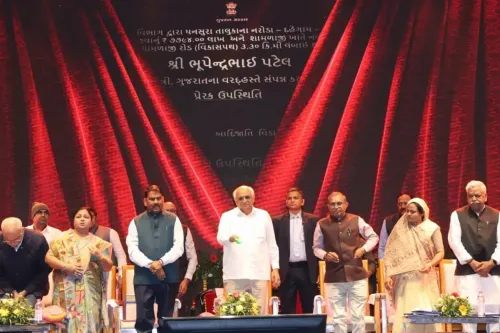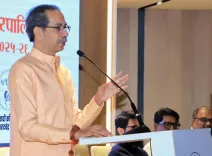What Measures is the Supreme Court Taking Against Digital Arrest Scams?

Synopsis
Key Takeaways
- Supreme Court expresses concern over cybercrime.
- Over Rs 3,000 crore extorted from citizens.
- Fraudsters impersonate law enforcement officials.
- Investigations being led by the CBI.
- Next hearing set for November 10.
New Delhi, Nov 3 (NationPress) The Supreme Court on Monday voiced significant alarm regarding the escalating threat posed by cybercrimes, which have reportedly resulted in the extortion of over Rs 3,000 crore from the public, particularly targeting vulnerable senior citizens.
A bench comprising Justices Surya Kant, Ujjal Bhuyan, and Joymalya Bagchi was reviewing a suo motu case related to the alarming rise of "digital arrest" scams, wherein fraudsters masquerade as law enforcement and judicial officials, employing forged court orders to swindle money from unsuspecting victims.
During the proceedings, the Justice Surya Kant-led Bench learned that these criminal syndicates were operating not only within Indian borders but also from international locations.
In sealed cover submissions, the Central Bureau of Investigation (CBI) and the Union Ministry of Home Affairs (MHA) revealed that networks involved in digital arrest scams were frequently based in nations such as Myanmar and Thailand.
Stressing the necessity to empower investigative agencies via judicial orders, the apex court remarked: "It is shocking that over Rs 3,000 crore have been extorted from victims, including senior citizens. If we do not implement strict and severe directives, this issue will escalate. We are committed to addressing these crimes with iron hands."
Solicitor General Tushar Mehta, the second-ranking legal officer of the Centre, informed the bench that the CBI has commenced investigations into several cases, leveraging technical support from the MHA’s Cyber Crime Division.
The Supreme Court has also designated an amicus curiae to assist in the proceedings, with an additional hearing set for November 10.
In earlier sessions, the Justice Surya Kant-led Bench ordered all states and Union Territories to submit details of First Information Reports (FIRs) related to these scams.
Noting that "digital arrest" scams seem to have a pan-India, or even cross-border, characteristic, the apex court proposed that the investigation be transferred to the CBI.
"There have been multiple incidents occurring in various locales. We are inclined to assign the matter to the CBI across all states because this type of crime may be operating on a national level, or even beyond our borders," the apex court stated.










